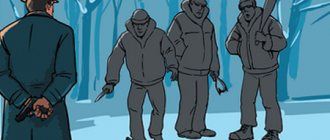Characteristics of the concept
The concept of self-defense in the Criminal Code of the Russian Federation is presented as causing harm to another person while trying to protect one’s legal rights and personality. To qualify a person’s actions as self-defense, there must be a direct threat of violence or an immediately dangerous attack. In this case, the threat must be noted from the beginning of the attack until its completion. The danger must be real, and not imaginary, that is, it must really exist in fact, and not in the imagination of the defending person.
To understand the specifics of qualifying actions under Article 37, we can consider an example in which a drunken Sidorov decided to play a joke on his neighbor. He waylaid him as he left the kitchen, pointing a child's crossbow at him. A neighbor, leaving the kitchen in a communal apartment, was holding a knife in his hands; when he saw a crossbow aimed at himself, he threw the knife at the drunken intruder. In this situation, the threat to life was not real; accordingly, the person who threw the knife will be held accountable for causing moderate injuries.
Article 37 of the Criminal Code of the Russian Federation will be charged if, during the beating, the victim grabs a knife and thrusts it into the offender. She should do this precisely at the moment of striking her, but not after the attacker stopped beating her and left, and not before he touched her for the first time.
There are two types of necessary defense, one related to exceeding limits and the other not related to them. Determining the type of self-defense is very important, because it has a direct impact on the qualification of actions and the choice of punishment.
There are certain conditions for the legality of protecting your life.
These include:
Punishment for exceeding the limits of self-defense and the corpus delicti under the Criminal Code of the Russian Federation, Article 108
- the purpose of causing harm to another person should be solely protection from attack, not punishment or retribution;
- a defending person can protect from encroachment not only his interests and rights, but also the interests and lives of third parties;
- harm from self-defense must be aimed exclusively at the attacker;
- harm to the attacker in the process of self-defense must be caused taking into account the nature of his attack.
An example of a necessary defense in criminal law would be a situation in which, while walking in the park, a guy and a girl noticed a fight. One of the fighters was a policeman. As the guy came closer, he noticed that the policeman had a knife sticking out of his stomach. The attacker pulled out a second knife and walked towards the girl, at which time the guy grabbed a pistol from the wounded law enforcement officer and shot at the attacker. The guy’s actions will be qualified as self-defense, because there was a real danger of causing bodily harm to the girl, and he had the right to protect the lives of third parties from a dangerous act.
The legislation does not provide for mandatory compliance with the principle of proportionality. That is, the court will not take into account the fact that the attacker wielded a knife, but was stopped by a firearm.
Self-defense is considered legal if it is directed against the actions and inactions of the offender, for example, if a railway station employee did not move the switch, which led to a train crash. The necessary defense can be directed against both intentional and unintentional attacks. It is very important to note that the victim has the right to defend himself, even if the attacker is a minor, but it is necessary to provide such a confrontation that will cause the least harm to the minor.
Defense that is directed against the actions of law enforcement officials is not considered justified. Upon arrest, resistance will be regarded as disobedience to the police and will entail criminal liability. It is not considered legal to resist when provoking an attack for reprisal under the guise of self-defense.
Necessary self-defense: whose side do the courts take in Russia?
Vladimir Putin will ask the Supreme Court to analyze the enforcement of rules on necessary self-defense. The head of state stated this at a meeting of the Human Rights Council. The reason was a resonant story when, in early October, in the Moscow metro, three guys beat up 25-year-old Roman Kovalev, who stood up for a girl. Afterwards they talked a lot about why there were no men in the subway car who could help put the hooligans in their place. According to human rights activists, most likely, no one began to do anything, because the manifestation of nobility could lead to being put in the dock. told MIR 24 TV channel what is wrong with judicial practice in such cases in Russia .
— Today, this is exactly the practice - can you find yourself in the dock when defending your own life?
Sergey Afanasyev:
Unfortunately, yes, this often happens when people with good intentions stand up for someone - either themselves, or their family, or for strangers, harm the attacker, and then judge these people. You need to understand where the fine line is between responsibility and real self-defense.
— In your practice, were there cases where you had to prove the necessary self-defense, but it was very difficult to do this?
Sergey Afanasyev:
There was such a thing quite recently in production. There was an attack on a person; there were more attackers, but he was alone, and in the end it so happened that he alone caused harm to the health of all the attackers. Either from fear, or from what, it so happened to him (he is not an athlete) that every blow he struck caused fractures to his attackers. He struck each one once. He was convicted of causing harm to health, we tried to prove that it was necessary defense, that he did not exceed the limits of necessary self-defense, but, unfortunately, he was convicted. The punishment was in the form of a fine, but the very fact that the verdict was guilty.
— According to the court’s explanations on necessary self-defense, you cannot shoot in the back of someone running away, and if a person’s life is under threat, he has the right to protect it by any means. If this is so, why, when defending yourself and your loved ones, is there always a chance of ending up behind bars?
Sergey Afanasyev:
Because in the law this is a relative concept. There is a fine line that must be determined: whether the limits of necessary self-defense were exceeded, or whether the actions of the defender were proportionate to the actions of the attackers.
If a person attacks with a weapon and the defender uses a weapon, and as a result kills the attacker, then in reality the limits of necessary self-defense are not exceeded, because his life was objectively threatened by the weapon in the hands of the attacker. If they begin to insult a person and slap him in the face, for example, and in response the defender takes out a knife and hits him, of course, this will be a clear excess of limits, and he will be judged here.
It is impossible to unite all cases, each case is individual, and it is always assessed whether there was necessary self-defense in this situation or not.
- What should be done?
Sergey Afanasyev:
All explanations already exist. There is an explanation from the Plenum of the Supreme Court on Defense, there is established practice. Resonance is also important. There are cases that pass without resonance, and they are assessed as they are. And there are high-profile cases where public opinion needs to be taken into account. This can also influence the acceptance of where this line is. Everything is individual, but all explanations exist. And the Plenum of the Supreme Court exists separately, and the courts are guided by it.
— Should the courts have an unambiguous position on assessing a person’s actions in such situations?
Sergey Afanasyev:
Of course yes. It often happens when people see an offense or a crime and are afraid to intervene in it, because their actions cannot replace the authorities, the police.
“We don’t have the concept of civil arrest.”
Sergey Afanasyev:
Yes, this doesn’t exist here. If the functions of such detention are provided for by the police, then when a crime or offense is committed, we must call the police officers and, perhaps, protect others, but interfere in this process... On the one hand, the law says that we have the right, because we are preventing a crime. Even if during this intervention we cause harm to the attacker, this is not an excess of the norms of necessary self-defense, because we are protecting other persons whose life and health are in danger.
On the other hand, we cannot replace the police with our functions, so there are no clear distinctions and legal coverage among the masses. It would be useful if police officers would make such an explanation so that people in the country know how they can act, whether we have (legally there is no civil detention or arrest) civil arrest, whether it can be used and within what framework. People don’t know, and often decide not to interfere, because then they themselves will be held responsible.
— Do we need to clarify so that protection does not turn into a crime?
Sergey Afanasyev:
Yes, so that no criminal acts are committed. A person must understand what actions he can take in such a situation; some kind of legal education is needed. People don’t understand, people who even have a legal education sometimes don’t understand where this limit is. When we give absurd examples, they are obvious, for example, a person without a weapon, and you attack him with a weapon - this is a clear excess.
- When he is alone, and several people attack him, but without weapons, what should he do? Does he have the right to use improvised means?
Sergey Afanasyev:
That's the question. Each case will be individual. We know in practice cases where such attacks were regarded as protection of life and health, and there were cases where people were tried under Article 105, including such practice.
Even when a person comes into your home, where you have a minor child, when it is not clear what is on his mind, why he broke into your apartment or house, and violence, serious harm or murder is caused to him, if you fired a weapon, and then the person tried for exceeding limits and for killing another. Where is this line if he climbed over my fence and climbed into my house? I don’t know what’s on his mind, I’m protecting my children. There is practice like this and that, this issue requires deeper clarification.
— How to act if you become a witness or victim of an attack or crime, so as not to change places with the criminal and not end up in the dock?
Sergey Afanasyev:
It’s difficult to say, because we ourselves can behave unpredictably in such a situation, not be aware of it, because the attack can be sudden. What your actions will be is also unpredictable. If we see what is happening, the first thing we need to do is call the police, if we see that a person is being beaten in the subway. In the future, perhaps, try to intervene, but with words at least from a distance, so as not to provoke aggression, so as not to provoke someone to beat you.
First call the police and then try to take action to keep others safe to apprehend the criminals.
Excess of self-defense
All actions of the defender must fit within certain limits of what is permitted; if these limits are exceeded, the defender will be recognized as a criminal. Excess of self-defense is qualified when the attacker suffered more harm than was necessary. Criminal liability for exceeding the necessary self-defense measures occurs if signs of a crime are found in the actions of the person who defended himself from the attack.
If a person, while offering resistance, was in a state where he could not assess the proportionality of his actions to the attack, he does not bear responsibility. The fact is that the state of inadequacy itself was caused by the assault; there is a direct cause-and-effect relationship. An example of this situation is an attempt by an adult man to rape a young adult girl. With his harassment, the criminal frightened the girl so much that in an attempt to avoid violence, she inflicted severe physical injuries on him with a stone. But the attacker did not use a weapon on her.
Exceeding the limits of self-defense is qualified under Article 114 of the Criminal Code of the Russian Federation or under Art. 108, if in the process of self-defense the attacker was killed. These two articles are imputed exclusively in the presence of direct intent. That is, the person defending himself must understand that the method of defense he has chosen does not correspond to the degree of danger and the nature of the harm caused to him. The indifference of the defender to the severity of the harm caused to the attacker will also be considered direct intent.
An example of exceeding self-defense measures would be a situation in which citizen Sidorova, while visiting citizen Ivanov, quarreled with the owner and decided to leave. Citizen Ivanov prevented her from leaving the apartment, but she took two knives from the kitchen and hit the owner in the hand with one of them, then left the apartment. On the staircase, citizen Ivanov caught up with her and began to choke her, at which time she used a second knife and stabbed the attacker in the heart, from which he died. Citizen Sidorov will be held accountable under Article 108 of the Criminal Code, since there is direct intent - she took two knives for defense. But the citizen did not pose any particular danger to her by preventing her from leaving the apartment.
Exceeding the limits of necessary defense in Article 114 of the Criminal Code of the Russian Federation
The situation with intent looked different when citizen Petrenko noticed that a thief was breaking into the window of his house and shot at the ceiling with a hunting rifle to scare off the intruder. The bullet ricocheted and hit the thief in the leg, from which the leg was subsequently amputated. In this situation, there is no direct intent; accordingly, the legislator does not provide for criminal liability. If, having noticed the thief, the owner of the house rushed to catch up with him, firing shots and hitting him in the leg, he would be brought to criminal liability, since he turned from a victim into an attacker.
Article 37 of the Criminal Code of the Russian Federation
Article 37 of the Criminal Code of the Russian Federation states that a person who was in a state where he was forced to defend himself or to defend other persons caused harm to the person who attacks him and his actions are associated with violence or the threat of violence will be exempt from liability .
Since there will be no corpus delicti in his act. Defense from illegal actions unrelated to violence or an assault dangerous to life will be considered justified only if the defender has not exceeded the permissible limits of defense.
The limits of necessary defense are not considered exceeded if the attack on the defender was unexpected and he could not fully assess the degree of danger, thereby not having time to make an objective decision.
The provisions of Article 37 of the Criminal Code of the Russian Federation are applicable to all categories of citizens, regardless of whether they have the skills to use physical coercion measures or defend themselves with improvised means.
You will learn how to protect yourself from hooligans on the street from this article .
How to prove self-defense?
Very often there are situations in which it is not enough to resist the attacker, but you also need to know how to prove self-defense in court in order to avoid liability. The importance of necessary defense in criminal law is enormous; no one can prohibit a person from taking advantage of the opportunity of self-defense. If you can correctly use this right, no one will blame you later for not wanting to resolve everything peacefully or not waiting for the police. If it turns out that you inflicted serious injuries on the attacker in self-defense, the first thing to do is to provide him with medical assistance and call an ambulance.
Do not run away under any circumstances, because leaving a person in danger is also a criminal offense.
From the point of view of the law, it does not matter whether the illegal act is carried out intentionally or through negligence. If they start strangling you in a dark entrance, the first thing you do is resist. You don’t have time to figure out whether this is a real criminal or a drunk neighbor who decided to play a joke on you. It is important that your resistance is timely, not premature, and not late. Of course, you shouldn't wait to get stabbed, but you should resist when there is a real threat.
In order to confirm this threat in court, try to remember what the criminal said at the time of the attack, how he behaved, remember, maybe someone saw your confrontation, describe in detail the circumstances of the attack, this is of great importance.
You will be provided with detailed advice on how to behave after the police arrive, and you must hire one. Before the police arrive, behave calmly, not aggressively, do not accuse the attacker of anything, the court will sort it out. Your aggressive behavior will be a sign that you feel guilty. If you understand that you have exceeded self-defense, but do not want to be held responsible for it, try to somehow make amends directly to the injured attacker. You can go to peace with him or compensate him for certain damage.
Unfortunately, there are many precedents in judicial practice when self-defense actually took place, but it was not the attacker who was convicted, but the person defending his rights and property. Everyone can determine the degree of seriousness of aggression and illegal intentions towards themselves in different ways. For some, the threat to life is considered as real, while others perceive it as a common occurrence. Our courts, as a rule, are far from wanting to establish the truth, so they make a decision that will be easier to argue.










